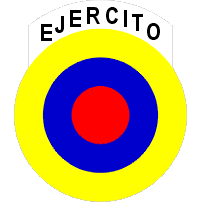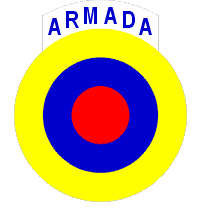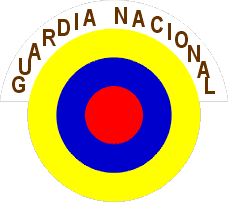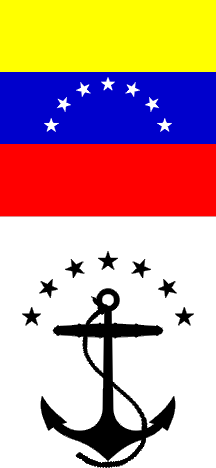
by Zeljko Heimer, 24 August 2003

Last modified: 2004-12-28 by dov gutterman
Keywords: venezuela | air force | naval aviation | army aviation | roundel | fin flash |
Links: FOTW homepage |
search |
disclaimer and copyright |
write us |
mirrors
See also:
Fuerza Aérea Venezolana was formed in 1920 as Aviación
Militar Venezolana and became independent force on June 22, 1946.
Naval Aniation (Aviación Naval de Venezuela) was formed in the
1960'. Army aviation (Servicio de Aviación del Ejército
Venezolana) was formed in 1978 and National Guard aviation
(Guardia Nacional - Destacamento Aero) was formed in 1974.
[cos98] report that the current
roundl of the FAV was adopted in 1956 and before that it used the
same roundel but without the bars (same one that is used by other
branches today). Somhow, [cos98]
don't report the naval marking, while [whe86]
report them.
It also seems that the FAV is replacing the roundel with
the national flag and use the combat symbol as fin flash as seen
at:
<www.scramble.nl/orbat-f5.jpg>
, <www.scramble.nl/orbat-tucano.jpg>
and <www.airliners.net/469176>.
Photos:
FAV "official" marking: <www.airliners.net/539714>
and <f-86.tripod.com>.
Naval marking - <www.airliners.net/384107>.
Army marking (same as FAV) - <www.scramble.nl/orbat-m28.jpg>.
Guardia Nacional marking - <www.scramble.nl/orbat-gn-a412.jpg>.
See also <www.fav.mil.ve>,
<www.fav-club.com>
and <www.scramble.nl>.
Dov Gutterman, 28 June 2004

by Zeljko Heimer, 24 August 2003
Apparently, it had origin in World War II along with most of
the emblems used at the moment for the same object. It consists
of three concentric circles of equal width with the colors yellow
outside, dark blue at center and red inside, completed with two
horizontal extensions at both sides that have the same colors
placed up to down in equal thirds.
Raul Jesus Orta Pardo, 18 January 2002
It is very probable that all Venezuelan roundels finds a
common origin in the Tricolor Cockade (Cap badge) which
reproduces under analogue form the National flag, whose
antecedent was that one approved on 1811 as result of the
Declaration of Independence and consisted of three concentric
circles: blue outside; yellow wider to the center and red inside.
The Cockade is used mainly as military emblem although that does
not exclude its civil use.
Raul Jesus Orta Pardo, 22 January 2002
According to Album 2000 Corr. 3 [pay03]
- Airforce Aircraft Marking - Yellow-blue-red roundel with a
yellow-blue-red bars at sides.
Zeljko Heimer, 24 August 2003

by Zeljko Heimer, 24 August 2003
A derivate of the Venezuelan Air Force Roundel, it consists of
three concentric circles of equal width with the colors yellow
outside, dark blue at center and red inside, completed in their
superior part with a white ribbon with the inscription
"EJERCITO" (ARMY) in black capital letters. In some
occasions also it does without the ribbon.
Raul Jesus Orta Pardo, 18 January 2002
According to Album 2000 Corr. 3 [pay03]
- Land Army Aircraft Marking - Yellow-blue-red roundel with a
white panel along the top inscribed EJERCITO in blue letters.
Zeljko Heimer, 24 August 2003

by Zeljko Heimer, 24 August 2003
A derivate of the Venezuelan Air Force Roundel, it consists of
three concentric circles of equal width with the colors yellow
outside, dark blue at center and red inside, completed in their
superior part with a white ribbon with the inscription
"ARMADA" (NAVY) in black capital letters.
Raul Jesus Orta Pardo, 18 January 2002
According to Album 2000 Corr. 3 [pay03]
- Navy Aircraft Marking - Yellow-blue-red roundel with a white
panel along the top inscribed ARMADA in black letters.
Zeljko Heimer, 24 August 2003

by Zeljko Heimer, 15 December 2004
A derivate of the Venezuelan Air Force Roundel, it consists of
three concentric circles of equal width with the colors yellow
outside, dark blue at center and red inside, completed in their
superior part with a white ribbon with the inscription
"GUARDIA NACIONAL" (NATIONAL GUARD) in black capital
letters.
Raul Jesus Orta Pardo, 18 January 2002
According to Album 2000 Corr. 3 [pay03]
- Constabulary Aircraft Marking - Yellow-blue-red roundel with a
white panel along the top inscribed GUARDIA NACIONAL in brown
letters.
Zeljko Heimer, 24 August 2003

by Zeljko Heimer, 24 August 2003
Is an adaptation of the Venezuelan Civil Flag disposed on the
tail of some military and civilian aircrafts, although usually
these ones reproduces the national flag without the National Coat
of Arms in the fuselage.
Raul Jesus Orta Pardo, 18 January 2002
According to Album 2000 Corr. 3 [pay03]
- Fin Flash Airforce - Square version of the national flag, i.e.
yellow over blue over red tricolour with seven white five-pointed
stars in an arc in the middle of the blue stripe.
Zeljko Heimer, 24 August 2003

by Zeljko Heimer, 24 August 2003
According to Album 2000 Corr. 3 [pay03]
- Navy Aircraft Fin Flash Marking - Squre depcition of the
national flag (sans Coat of Arms) atop the black naval emblem:
the fouled anchor with seven five-pointed stars in the arc above
it.
Zeljko Heimer, 24 August 2003

by Zachary Harden, 20 December 2004
Originally called "Venezuelan Air Force Combat Aircraft
Symbol", it was product of the creativity and collaboration
of Mr. JULIO DELGADO FLORES, Graphic Designer of the Department
of Engineering of the Logistic Command and incorporated like
attribute for characterize the combat component of the VAF flying
inventory under the administration of General of Division
(VAF) MAXIMILIANO HERNANDEZ VASQUEZ on 1982.
EMBLEMATIC DESCRIPTION:
1. - Attributes: It iss a pennant with shape of isosceles
triangle enameled in red, which loads in its center the figure of
a turbine in silver with two golden rays at its right side and a
number eleven in capital Roman digits in black with yellow
shades.
2.- Meaning: The red field symbolizes the Courage, the
Intrepidity, the Warlike Spirit, the Honesty and Discretion
required to obtain the Victory, with the purpose of preserving in
every critical moment the National Sovereignty, arriving to the
bloodshed even to be necessary. The rays remember the Speed and
Precision required in the war actions, on the one hand and by the
other, the Power and the Force of the weapon systems, represented
properly by the silver turbine, that in addition remembers the
Clarity, the Integrity and the Shine of Human and Professional
Virtues of our Combat Aviators. Number eleven constitutes a
tribute to the same number of the Venezuelan Independence War
Chief Commanders who demonstrated Determination, Tenacity,
Tactical Sense and Strategy in the Command of the Patriotic
Forces that bequeathed Autonomy to our Country.
Raul Jesus Orta Pardo, 18 January 2002